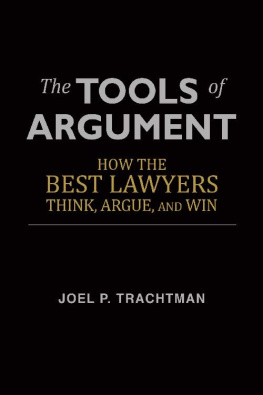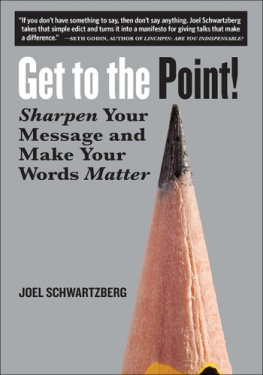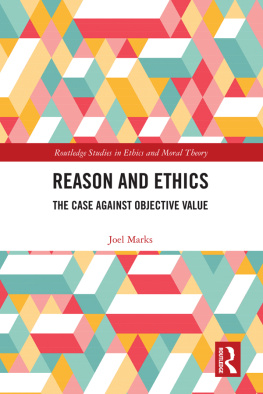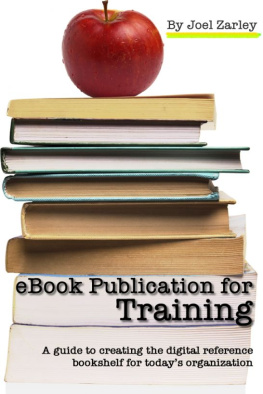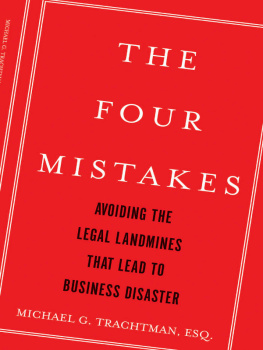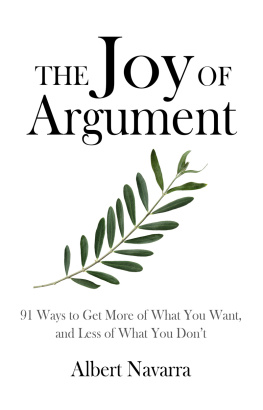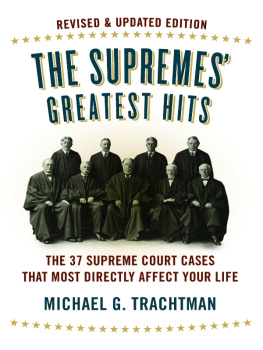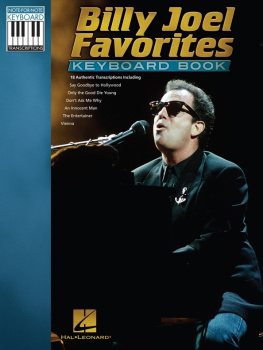Joel Trachtman - The Tools of Argument: How the Best Lawyers Think, Argue, and Win
Here you can read online Joel Trachtman - The Tools of Argument: How the Best Lawyers Think, Argue, and Win full text of the book (entire story) in english for free. Download pdf and epub, get meaning, cover and reviews about this ebook. year: 2013, publisher: Createspace Independent Publishing Platform, genre: Politics. Description of the work, (preface) as well as reviews are available. Best literature library LitArk.com created for fans of good reading and offers a wide selection of genres:
Romance novel
Science fiction
Adventure
Detective
Science
History
Home and family
Prose
Art
Politics
Computer
Non-fiction
Religion
Business
Children
Humor
Choose a favorite category and find really read worthwhile books. Enjoy immersion in the world of imagination, feel the emotions of the characters or learn something new for yourself, make an fascinating discovery.
- Book:The Tools of Argument: How the Best Lawyers Think, Argue, and Win
- Author:
- Publisher:Createspace Independent Publishing Platform
- Genre:
- Year:2013
- Rating:5 / 5
- Favourites:Add to favourites
- Your mark:
- 100
- 1
- 2
- 3
- 4
- 5
The Tools of Argument: How the Best Lawyers Think, Argue, and Win: summary, description and annotation
We offer to read an annotation, description, summary or preface (depends on what the author of the book "The Tools of Argument: How the Best Lawyers Think, Argue, and Win" wrote himself). If you haven't found the necessary information about the book — write in the comments, we will try to find it.
Joel Trachtman: author's other books
Who wrote The Tools of Argument: How the Best Lawyers Think, Argue, and Win? Find out the surname, the name of the author of the book and a list of all author's works by series.
The Tools of Argument: How the Best Lawyers Think, Argue, and Win — read online for free the complete book (whole text) full work
Below is the text of the book, divided by pages. System saving the place of the last page read, allows you to conveniently read the book "The Tools of Argument: How the Best Lawyers Think, Argue, and Win" online for free, without having to search again every time where you left off. Put a bookmark, and you can go to the page where you finished reading at any time.
Font size:
Interval:
Bookmark:
PRAISE FOR THE TOOLS OF ARGUMENT
In his new book The Tools of Argument: How the Best Lawyers Think, Argue, and Win , Professor Joel Trachtman lays out the many intricacies related to how lawyers frame arguments. It is a masterly treatment of a complex and compelling set of issues. There is much to learn here, both for the experienced practitioner and for the novice to the field.
James R. Silkenat, President,
American Bar Association (2012-13)
and Partner, Sullivan & Worcester
Professor Trachtmans book is required reading for lawyers, those who hire or work with lawyers, anyone interested in understanding the dynamics of legal negotiations or of political debate, and anyone interested in winning arguments. Its unique and practical approach strips away jargon to isolate the core elements of legal reasoning and argumentation in a way that is accessible and applicable in everyday situations. Non-lawyers will find it a useful guide to effective persuasion.
John A. Burgess, Partner, WilmerHale
Joel P. Trachtman is Professor of International Law at The Fletcher School of Law and Diplomacy at Tufts University. An authority on international business and economic law, he has published six academic books and over 80 scholarly articles, and regularly lectures at leading universities, companies, and organizations around the world. Prior to joining the Fletcher School faculty, Trachtman practiced law with Shearman & Sterling, a Wall Street law firm, in New York and in Hong Kong.
THE TOOLS OF
ARGUMENT

How the Best Lawyers Think, Argue, and Win
JOEL P. TRACHTMAN
Copyright 2013 Joel P. Trachtman
All rights reserved.
Library of Congress Control Number: 2012923785 CreateSpace Independent Publishing Platform North Charleston, South Carolina
ISBN: 1481246380
ISBN 13: 9781481246385
eBook ISBN: 978-1-63003-260-9
www.toolsofargument.com
No part of this publication may be reproduced in any manner whatsoever without written permission from the copyright holder, except in the case of brief quotations embodied in articles or reviews.
To Lauren
Contents
Preface
Have you ever been in the midst of a discussion or argument regarding business, politics, ethics, sports, family responsibilities, or any other contentious topic and felt that your opponent did not have the right position, but had the better argument? Why is it that some peopleoften lawyerscan use reasoned arguments to debate with frustrating effectiveness? Perhaps you wished that you had a greater repertoire of skills both to make your points and to counter those put forth by your opponent. This book will help. Why not take advantage of the professional-grade tools of argument that have been honed through the ages in the discipline of law?
The purpose of this book is to equip law students, new lawyers, paralegals, and executives, as well as anyone else who wants to improve their skills of reasoned persuasion, with the powerful and time-tested tools of argument. Can you recall a time when you identified the loose thread or logical flaw in your opponents argument, pointed it out, and felt a sense of vindication? At that moment, you might have exclaimed to your opponent that he or she had been lawyered! If you liked that feelingor if you wished you had a more persuasive way to articulate your opposing viewsthen you will enjoy and benefit from this book.
After practicing and teaching law for over 30 years, I have come to believe that the tools of argument are remarkably valuable. Indeed, these skills are useful to all of us who engage in small or large business dealings, legal proceedings, governmental operations, or other negotiations, and who enjoy critical thinking, persuasive presentation of ideas, and victory in arguments. After all, winning arguments is much more fun than losing them.
I have also come to believe that acquiring the skills and mindset to think and argue like the best lawyers is not especially difficult. The problem has been that there are few places where one can learn about these techniques in a form that abstracts the essential nuggets of wisdom from their complex historical and legal contexts. Such a presentation is my goal for this book. Ive distilled a comprehensive arsenal of the types of arguments one can make in reasoned discourse, as well as the responsive counter-arguments. I can think of no better way to prepare for argument than to read this book with your own settings in mind, anticipating how you can use the tools, or how your opponent might use them, and how you can deftly respond.
Law students and prospective law students: you will find in this book a unique perspective that will enhance your understanding of legal principles and help you participate with confidence in classroom discussions and debates. Once you have a comprehensive and explicit framework of the arguments and counter-arguments, you can readily see the structure of legal discourse in briefs, cases, and classroom debate. Newly minted lawyersand even experienced legal practitioners: I hope that you will find this book a useful refresher and checklist of the essential tools that can greatly increase your odds of winning any dispute.
If you are not a lawyer, these argumentation skills will be helpful in both non-legal settings and in any legal setting in which you might find yourself. (Indeed, these tools of argument are too valuable to be left solely in the hands of the lawyers.) Further, this book will shed light on the structure of the legal system, which is the principal structure in the U.S. and in other rule-of-law-based societies for making public policy and for assigning private responsibility, thus helping you become more engaged and knowledgeable citizens. A large proportion of the news of the day has a legal dimension, and you will undoubtedly understand more if you have a sense of the types of arguments that are used.
Of course, in some social and interpersonal settings, it will be unseemly or even dangerous to think and argue like a lawyer, as most lawyers eventually learn by painful experience. Dont try arguing to someone to whom you are romantically attracted that you have a right to their reciprocal affection, or that they bear the burden of proving that you are not attractive to them.
But it is good to know the techniques because, on balance, they will be useful to you in a variety of waysperhaps in the context of convincing a business colleague of the right strategy, compelling a supplier to comply with its obligations, obtaining a refund for a defective product, securing insurance coverage for a needed medical treatment, or persuading the local youth soccer director to reinterpret a league rule. Consider: is there an issue of precedent? Was an agreed-upon process followed? Does the decision-maker have appropriate jurisdiction?
I believe in the importance of learning these skills because they workthey make a difference in winning or losing in the war of words. After all, these techniques of argumentation have evolved and survived over the course of many centuries because they have inherent, compelling logic. People respond to these arguments not because a speaker is overbearing, manipulative, or charismatic, but because they see the logic of the argument. Surprising as it may seem, legal logic is real logic, not separate from other types of logic. If you can bring this compelling logic to bear in legal, business, and interpersonal settings, you can be more persuasive. This book is designed to help you do just that.
Next pageFont size:
Interval:
Bookmark:
Similar books «The Tools of Argument: How the Best Lawyers Think, Argue, and Win»
Look at similar books to The Tools of Argument: How the Best Lawyers Think, Argue, and Win. We have selected literature similar in name and meaning in the hope of providing readers with more options to find new, interesting, not yet read works.
Discussion, reviews of the book The Tools of Argument: How the Best Lawyers Think, Argue, and Win and just readers' own opinions. Leave your comments, write what you think about the work, its meaning or the main characters. Specify what exactly you liked and what you didn't like, and why you think so.

